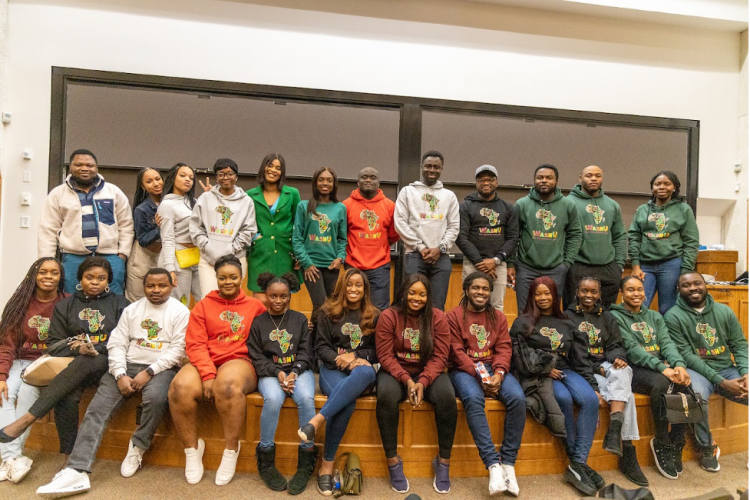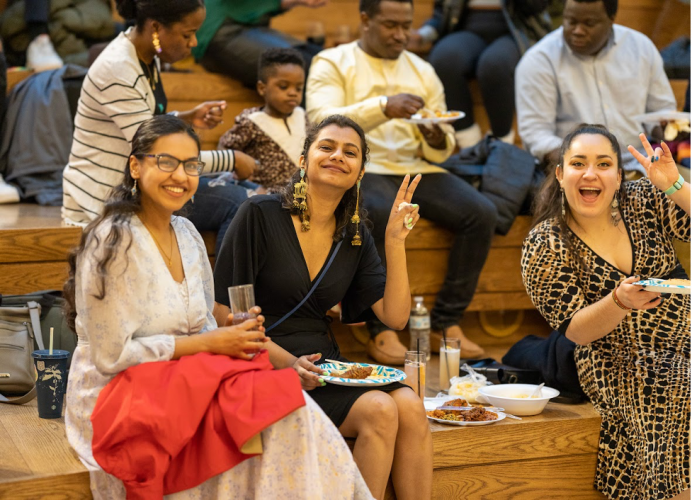Olin Africa Business Club Member Folakemi Ajoni, MBA 2024, wrote this for the Olin Blog.
Featuring the theme “The Future is Africa: Discovering Opportunities and Drivers of Growth,” the Olin Africa Business Club celebrated its annual Africa Business Forum recently with a fantastic lineup of educational, informative and entertaining activities with a hybrid delivery featuring speakers worldwide.
Day one
Attendees and members of the OABC arrived at Emerson Hall in colorful business casual attire, ready to hear the messages from the speakers.

Keynote speaker Wale Adeosun left many hungry for more. He spoke glowingly about the bustling African business landscape and the abundant opportunities waiting to be explored by the brilliant young minds in the room, leaving the audience charged with excitement. A key takeaway from his speech was that Africa’s prosperity is strongly dependent on the convergence of what he called the Three P’s: perception of risk, potential of outside sources and people, which encompasses passion, preparation and perseverance (Yes, he threw in some bonus P’s.).

Next was the general panel with Stella Salvo, Sam Baddoo, Derrydean Dadzie and Mahmood Mustapha. This session was moderated by our very own Gisele Marcus, professor of practice at Olin specializing in diversity, equity and inclusion.
The panelists shared their experiences of doing business in Africa, shaped by their defining moments. They also provided strategies for balancing their personal and professional lives, emphasizing the need for mentors. The last session for the day was the Fintech panel moderated by Folu Okunade of Hello Tractor, with discussions centered on what Fintech holds for Africa with the use of tech-based products and solutions to solve crucial issues and the peculiarities of running a fintech-centric business on the African continent.

The OABC team then hosted the speakers and guests in a celebratory banquet with faculty and executives in attendance. An honorary award was presented to Wale Adeosun for his continuous support and dedication to the club. Finally, the day ended on a high with a viewing of one of the highest-grossing Nigerian movies, “The Wedding Party,” to unwind after a successful day.
Day two
The second day began with a virtual healthcare panel moderated by Raphael Kodjoe of Amazon Web Services, with discussions on public health and social impact. There was so much to learn from this session, and as one of the panelists, Sam Baddoo, said, “The future is Africa; however, that future would cease to exist if Africa continues to be riddled with poor healthcare.”
The next session was the agriculture panel led by Joseph Opoku of Multimedia Group Limited. He asked the panelists speak about innovation in agriculture and the environment and its impact in Africa. They shared tidbits on how they have been able to run successful businesses in Africa despite challenges encountered and how best to navigate obstacles.

Now the fun part!
Later in the day, we had the much-anticipated fashion show and taste of Africa at the Frick commons. The turnout was epic! Food from all over Africa was available, ranging from Ghana’s Waakye to Nigeria’s pounded yam and Egusi, as well as Kenyan and Cameroonian food, giving our non-African guests an authentic taste of Africa and bringing back nostalgic memories of home for our Africans.

The show featured trivia games with the audience answering questions about Africa, Jollof wars between Nigeria and Ghana with Ghanaian Jollof winning the battle (this time!), a sensational dance performance by “two and a half Igbo girls,” poetry and musical renditions by OABC members and a host of others.
The highlight of the day was the phenomenal fashion show, which had models strutting down the runway in beautiful African attire (some of which were designed by fashion designer Adjo, CEO of Tribe 228), with the audience oohing and aahing at the breathtaking display of African heritage. Oh, what a proud moment to be African!
OABC members in Berlin were not left out, as they gave us a beautiful fashion show in their proudly African attire.
WashU faculty and staff were present in large numbers offering support to the team during the forum.

As all good things must come to an end: The Olin Africa Business Forum ended with a bang with a party themed “Africa to the World,” where we let our hair down in celebration of an eventful forum.
The OABC team outdid themselves with an eclectic mix of exciting events. The future really is Africa! And, as a famous African proverb goes, “where you sit when you are old shows where you stood when you were a youth.” The Olin Africa Business Forum will continue to provide a sturdy foundation for Olin’s youth to stand tall, paving the way for successful future leaders.
Video of the panel discussions during the Olin Africa Business Forum.
Find a photo gallery of the entire forum here.
Pictured at top: Speakers, OABC members and invited guests of the 2023 OABC business forum. Taken in Frick Forum, Knight Hall.















 “While applying to Olin, I realized there were many student clubs, but none related to business in Africa,” Mgbeahurike recalls. “I realized there was an opportunity to create an organization that could promote Africa and be a partner in achieving Olin’s mission and vision as a truly global school.”
“While applying to Olin, I realized there were many student clubs, but none related to business in Africa,” Mgbeahurike recalls. “I realized there was an opportunity to create an organization that could promote Africa and be a partner in achieving Olin’s mission and vision as a truly global school.” To learn more about OABC, please visit our
To learn more about OABC, please visit our 
 Chioma Ukeje, VP Finance
Chioma Ukeje, VP Finance Matilda Thomas (VP Programs)
Matilda Thomas (VP Programs) Sharon Mazimba (VP Programs)
Sharon Mazimba (VP Programs) Ubaka Ogbunude (VP Social)
Ubaka Ogbunude (VP Social) Eric Ontieri (VP Communications)
Eric Ontieri (VP Communications)